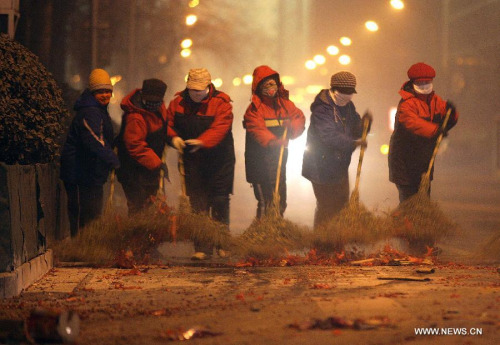
Sanitation workers clean the firecracker residue on a street in Beijing, capital of China, Jan. 23, 2012. A good deal of firecrackers has been set off on the eve of the Spring Festival as a kind of Ch
China's New Year firework spree has not only left thousands of tonnes of scraps in Beijing but also driven up the city's air pollution data to "hazardous" level until winds blew them away Tuesday morning.
The Beijing Environment Protection Monitoring Center said its monitoring station at the city's second ring road detected 1,593 micrograms of PM (particular matter) 2.5 per cubic meter at 2 a.m. Monday, after hours of fireworks burning spree on the eve of the Chinese Lunar New Year.
Beijing's environment authority only launched the PM2.5 measure of air quality one day ahead of the Spring Festival holiday, which starts on Sunday.
Monday's figure is 80 times higher than that recorded at 6 p.m. Sunday.
The PM2.5 gauge is considered stricter than Beijing's previous standard of PM10, as it monitors "fine" particles 2.5 microns or less in diameter.
Normally, 50 percent of the total PM2.5 particles in the air are contributed by automobile exhausts, and another 23 percent are brought by floating dust. However, Monday's air pollution was directly resulted from huge amounts of fireworks burning, according to environmental officials.
The municipal bureau of environmental protection said the concentration of sulfur dioxide in air, which is produced by firework powder burning, was as high as 1,318 micrograms per cubic meter of air at 1 a.m. Monday.
Cold currents helped blow away the pollution on Tuesday. The PM2.5 reading reached 29 micrograms per cubic meter of air at 8 a.m., suggesting the air quality is "good."
In Chinese tradition, fireworks were intended to scare away the "Nian" (year in Chinese), a mythical beast supposed to have preyed on people and livestock at the turn of the year. The monster, however, was afraid of bangs and the red color. Although few now believe the existence of the monster, Chinese families carry on the tradition of setting off fireworks.
Chinese big cities including Beijing had instituted bans on fireworks, as it polluted the air and led to injuries and even deaths.
However, the Beijing authorities lifted the ban in 2005 under public wishes that fireworks burning could create more festive atmosphere. But the government restricted setting off fireworks within certain areas during a 16-day period around the Spring Festival to reduce accidents and the impact on citizens' lives.

Copyright ©1999-2011 Chinanews.com. All rights reserved.
Reproduction in whole or in part without permission is prohibited.